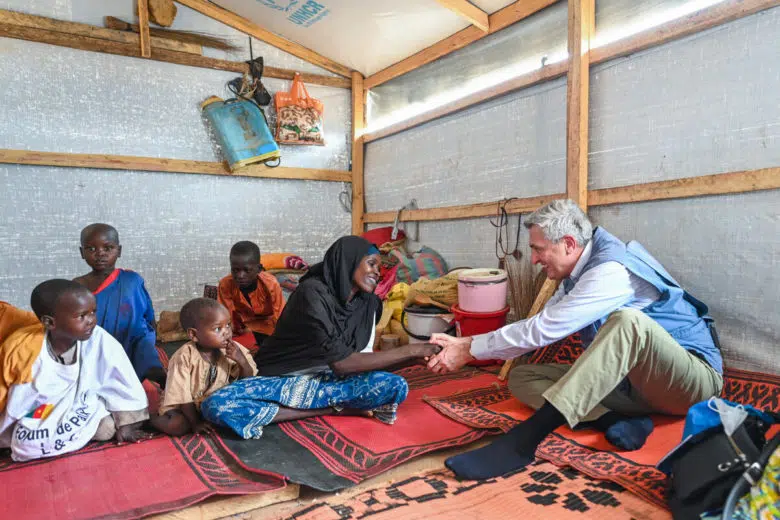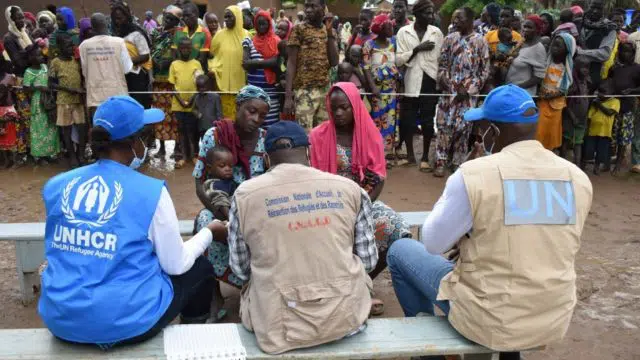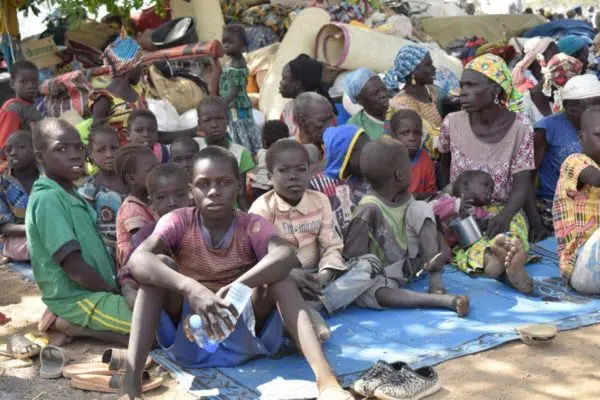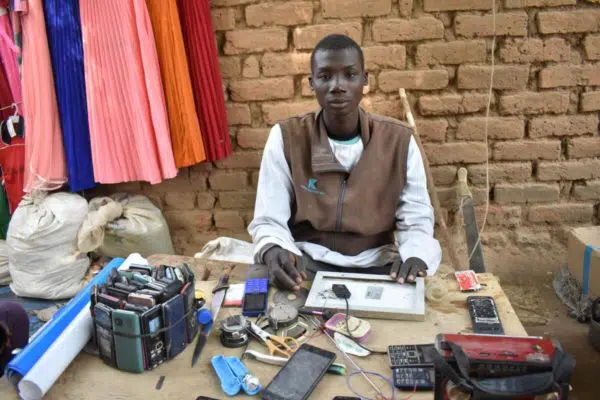
UN High Commissioner for Refugees Filippo Grandi meets Tomma Ndjinda and her children in their shelter at the Ardjaniré displacement site in Bogo, Cameroon. © UNHCR/Colin Delfosse
By Cedric Kalonji Mfunyi in Maroua, Cameroon
After water scarcity driven by climate change sparked deadly clashes in Cameroon’s Far North, UN High Commissioner for Refugees calls for reconciliation and more help for those affected.
When simmering disputes between herders, fishermen and farmers over scarce water resources in Cameroon’s Far North region flared into violence last December, Tomma Ndjinda’s village was among those caught up in the deadly clashes.
“Our village was attacked, and we were forced to flee without having time to take anything with us,” she says.
Ndjinda headed south in search of safety together with her husband and seven children, ending up at the Ardjaniré displacement site in Bogo. The site currently hosts around half of the 4,200 people in this area who fled the worst intercommunal violence ever seen in Cameroon’s Far North.
But faced with a desperate shortage of food and other resources despite the generous welcome shown by the local community, Ndjinda’s husband went back to salvage what he could of their crops and possessions.
“My husband tried to return to our village to harvest sorghum in our fields. But when he arrived, he discovered that migratory birds had eaten everything. All our belongings were also destroyed,” she explained. Tragically, her husband never made it back, and Ndjinda believes the shock of seeing what had become of their home led to his sudden death.
Now left to care for seven children on her own with no income, Ndjinda is at a loss to know how they will survive. “We are running out of everything. When the children get sick, I can’t take them to the hospital.”
The climate crisis is exacerbating competition for water and other resources in this part of Africa’s Sahel region, where temperatures are rising 1.5 times faster than the global average. Water levels in Lake Chad have decreased by as much as 95 per cent in the past 60 years, and the effects are being felt by communities that rely on the Logone and Chari rivers that feed the lake on Cameroon’s far northern border.
On a three-day visit to Cameroon that concluded on Friday, UN High Commissioner for Refugees Filippo Grandi met with Ndjinda and other displaced families affected by the recent violence, who described to him the pressing needs they face.
“Beyond efforts made by the authorities and the generosity shown by host communities, the needs for food, education and health care remain,” Grandi said. “We have also heard concerns over pressure on local services, underlining the need to increase our support to both displaced families and members of the local community who are hosting them.”
UNHCR and partners are working to establish secure displacement sites and deliver life-saving aid including water, shelter and household items. Together with the Cameroonian authorities, the agency has also led conflict-resolution efforts aimed at putting an end to the violence.
“Identifying the causes of conflicts and addressing them would ensure peaceful cohabitation among communities,” Grandi said. “Reconciliation and reconstruction are key to pave the way for for voluntary and safe return of dispalced families.” He also called for an assessment of reconstruction needs in areas affected by violence.
During his visit to Ardjaniré, the High Commissioner visited a reforestation project that will plant 2,000 trees to help address the desertification being exacerbated by the climate crisis and provide additional resources and income opportunities for displaced and local communities.
The project is part of the Great Green Wall initiative, which aims to grow an 8,000-kilometre continent-wide barrier to combat land degradation, desertification and drought in the Sahel.
PLEASE DONATE TO SUPPORT CAMEROONIANS DISPLACED BY CONFLICT
Originally published by UNHCR on 01 May 2022.





